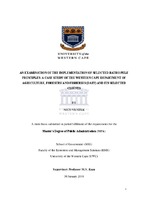| dc.description.abstract | The Batho Pele principles can be seen as a tool to help transform the South African public
sector by making it more responsive to the needs of its citizens. The White Paper on the
Transformation of the Public Service strives to enhance service delivery to all South Africans
(Taylor,2007).The role of the Batho Pele principles is to improve service delivery within the
public sector and to assist with the transformation of a public sector that is more effective and
people centred. However, if these principles are ignored, it will lead to a public sector that
only caters to the needs of the middle class and higher-income groups, thus leaving the lowerincome
citizens with a substandard of service delivery. Batho Pele means to put the people
first; however, that can only take place if these principles are implemented correctly and
continuously and their successes and challenges monitored and addressed (RSA, 1997b). If
the people are not valued, it will lead to a scenario where citizens lose trust in government.
This in turn, could lead to a decrease in active public participation. By not engaging and
consulting with the people, government will not adhere to the very first of the Batho Pele
principles. Service delivery to all citizens and a responsive public sector are yet to be
achieved (Taylor, 2007. Matas argues that the South African public sector lacks effectiveness
and efficiency and as a result of this, unequal service delivery is experienced by millions of
South Africans (Matas, 1994. The main research objective of this study is to examine the
implementation process of the Batho Pele principles through the case of the Western Cape
Department of Agriculture, Forestry and Fisheries (DAFF) and how it influences its
interactions with relevant clients/citizens. The reason why this department was selected was
due to the fact that this department within the Western Cape was solely responsible for
assisting wine farm owners across the country with the necessary submissions of wine
samples and scientific laboratory reports. This process facilitates the testing, approval and
marketing of the wines produced. | en_US |

